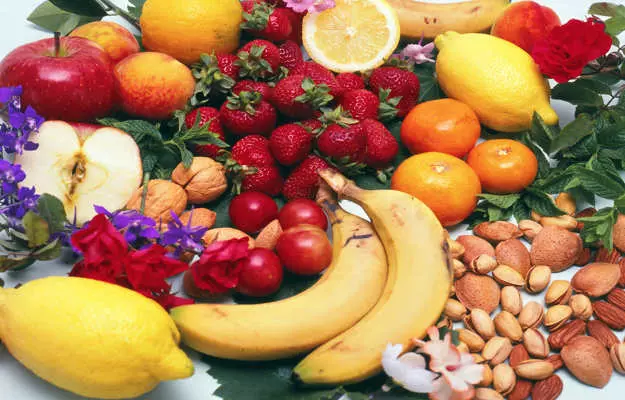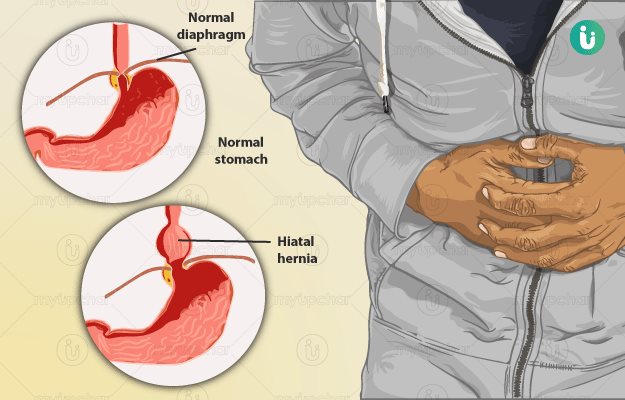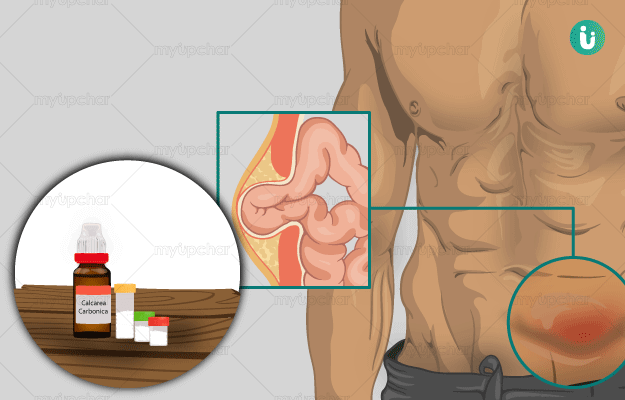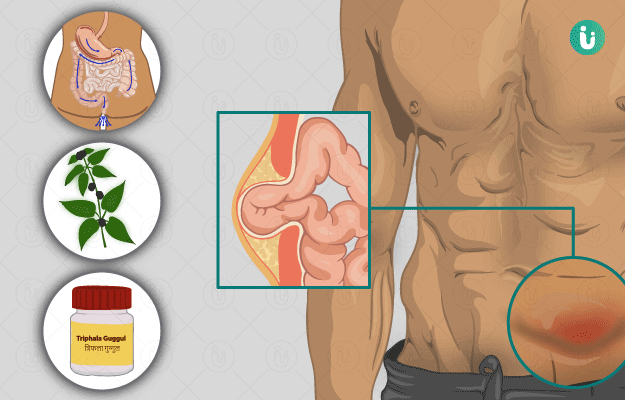A hernia is a medical term used for a condition where a part of an internal organ like the stomach pokes out of the adjacent muscle or tissue wall. The most common types of hernia are:
- Inguinal hernia: In this type of hernia, a part of intestine pokes through the inner thigh, near the groin area.
- Umbilical hernia: In this type of hernia, fat tissues bulge out through the abdomen near the navel.
- Hiatal hernia: In hiatal hernia, a part of the stomach pokes through the chest cavity.
- Incisional hernia: In this type of hernia, fat tissue starts bulging from the site of a healed abdominal or groin incision.
- Epigastric hernia: In this type of hernia, the fat tissues bulge between the navel and end of the sternum (middle part of the ribcage).
- Femoral hernia: This type of hernia affects the same part of the body as inguinal hernia - it happens when a part of the intestine pokes through the groin or inner thigh.
The common symptoms of hernia include:
- A bulge in the abdominal area, near the navel or near the chest area
- Constant increase in the size of the bulge
- Pain in the abdomen while lifting heavy objects
- Bowel obstruction (obstruction in the intestines)
- Constipation
- Gastric reflux, sometimes heartburn
- Bloating
There are certain food items which can improve and worsen the symptoms of a hernia. Here in this article, we will tell you about such food items which are indicated and contraindicated if you have a hernia.
What to eat when you have a hernia
You can consume the following foods and beverages in order to reduce the symptoms of hernia:
Eat apples in hernia
Apples are a rich source of potassium, magnesium and calcium. Apples are also rich in vitamin A, vitamin C, vitamin D, vitamin B6 and vitamin B12. Apples promote digestion and help in improving the bowel movement of the body. The magnesium content in the apples has the ability to reduce the excess acid content in the stomach which otherwise causes acid reflux in the case of hiatal hernia. You can have one small bowl of apples a day, to keep your stomach issues away.
Eat bananas when you have a hernia
Bananas are rich in fibre and potassium. Bananas coat the lining of the irritated oesophagus (food pipe), thus preventing damage due to acid reflux. The soluble fibre found in bananas, called pectin, helps in easy movement of the food throughout the digestive tract. You can have two bananas a day to reap its benefits.
Eat carrots when you have a hernia
Carrots are a rich source of beta carotene, fibre, potassium and various other antioxidants. Carrot juice prevents the degeneration of the stomach lining from conditions like gastric ulcers and gastritis (inflammation of the stomach). Carrot is a dietary fibre: it improves the condition of the stomach by aiding in digestion, thus relieving the symptoms of a hernia. You can add carrots to your daily diet as a vegetable accompaniment or in your salad.
Eat cinnamon when you have a hernia
Cinnamon has the ability to reduce the amount of acid production and digestive enzymes (pepsin) present in the stomach - an excess of these can damage the stomach lining. This helps the stomach to cool down a bit by reducing the pH of the stomach. Cinnamon also helps in reducing the heat produced by the stomach during the metabolism of the food, thus relieves the symptoms of a hernia. You can take two to three pinches of cinnamon powder in your milk thrice a week.
Eat whole grains when you have a hernia
Whole grains are unprocessed grains as they contain all three layers of the grain: bran, germ and endosperm. The bran is rich in fibre and can be helpful in treating constipation. Also, whole grains are rich in healthy fatty acids, which makes them easy to metabolise. Studies have shown that whole wheat products have the ability to treat inflammation of the stomach. You can eat whole grains like quinoa, whole wheat bread and pasta to reap these benefits.
Eat green vegetables when you have a hernia
Green vegetables are rich in magnesium and relatively low in carbohydrates. Green vegetables like asparagus, cilantro and parsley are rich in fibre and low in starch which makes them easier to digest than other fibre rich foods like beans and legumes. Green vegetables have chlorophyll in them which helps in reducing the inflammation of the body, including any inflammation in the digestive tract. You can include green vegetables in your diet in various forms, such as in your salad, in your subzi (vegetable accompaniment to breads) or in the form of juice.
Drink green tea when you have a hernia
Various studies have concluded that green tea has the ability to treat various digestive issues. A study concluded that a compound called polyphenol epigallocatechin gallate derived from green tea has the ability to treat stomach ulcers. Green tea also has the ability to treat gastric issues like pain in the abdomen, bloating and even diarrhoea. You can have a cup full of green tea daily to reap its benefits.
What not to eat when you have a hernia?
There are certain food items listed below which should be avoided if you have a hernia:
Avoid fatty food and beverages when you have a hernia
Several research studies have shown that the intake of high-fat foods like red and processed meats, high-fat dairy products, fried foods and beverages like heavy milkshakes and alcohol can worsen Gastroesophageal Reflux Disease (GERD) symptoms.
Avoid acidic food when you have a hernia
Foods like pineapples, tomatoes, tomato sauce, pickles and dishes made with vinegar have high levels of acid in them which relaxes the lower oesophagal sphincter muscles. This promotes acid reflux from the stomach to the food pipe (oesophagus).
Avoid sugary foods and beverages when you have a hernia
Food items like soft drinks, corn syrup, candies, frozen desserts, cakes, cookies, pies and pastries are high in sugar which makes them difficult to digest. Some studies conclude that added sugars can increase episodes of acid reflux.
Avoid starchy food when you have a hernia
Heavy starch products like potatoes, pasta, rice and bread can cause water retention in the body which may result in constipation. Consumption of starchy foods along with protein-rich foods (eggs, nuts and seeds and legumes) can cause acid reflux and indigestion.
Avoid citrus fruits when you have a hernia
Citrus fruits like oranges, grapefruits, lemons, limes and cranberries have the potential to increase the acid content of the stomach which can, in turn, increase the symptoms of heartburn. Citrus fruits also allow the lower oesophagal sphincter (the barrier between the stomach and the oesophagus) to relax which helps the stomach acid to move into the oesophagus (food pipe).















